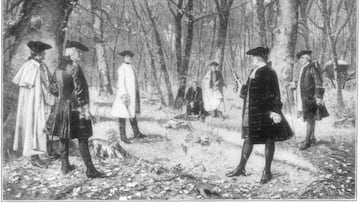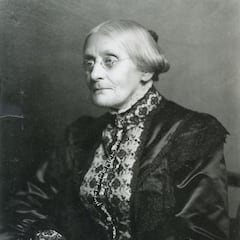US presidential election in 1800: The bizarre outcome between Jefferson and Adams that ended in a duel
The US is not unaccustomed to contentious elections, but they rarely result in violence. However, an electoral tie and a simmering feud led to shots fired.

When the Broadway spectacle ‘Hamilton’ debuted it became an instant sensation. Based on the life of Alexander Hamilton, it also related the events that led up to the founding of the United States and the early years of the fledgling nation.
From the beginning, the nation split more or less into two major political ideologies that have vied for control of the reins of institutional power at the ballot box ever since. One of the central features of the musical is the relationship between Hamilton and Arron Burr who ended up finding themselves on opposite sides of that political divide.
US presidential election in 1800: The bizarre outcome between Jefferson and Adams that ended in a duel
The truly bad blood between the two began with what Hamilton, who was a Federalist, felt was a betrayal when Burr, who was a Democratic-Republican, ran against the former’s father-in-law, Philip Schuyler in the 1791 New York Senate race. Burr won taking away a powerful ally in the upper chamber of Congress for the then-Treasury Secretary.
Further insult came in 1800 when a document Hamilton had written that was highly critical of John Adams, also a Federalist, that he had meant for private circulation was published by Burr. The incident was very embarrassing and caused an ever-greater rift in the Federalist Party.
On #ThisDayinHistory 1804, Aaron Burr shoots Alexander Hamilton in a duel.https://t.co/dOJDCTCswg pic.twitter.com/MsTUicBrSZ
— HISTORY (@HISTORY) July 11, 2017
Hamilton would have the opportunity to return the favor later that year when Thomas Jefferson, a Democratic-Republican, defeated Adams in the presidential election. However, Jefferson tied with the number two on the ballot, Burr.
It was the first year that parties formally nominated tickets with the plan that one elector would hold back their vote for the number two on the ticket so the preferred choice for president would win. At that time the runner-up would become vice president regardless of party affiliation.
With Jefferson and Burr tied in the Electoral College, it was up to the outgoing Congress to decide who would be president. Hamilton lobbied Federalists in Congress to vote for Jefferson who won on the 36th ballot.
The glove was thrown down, so to say, when Burr was running for governor of New York in 1804. At a dinner party, which was attended by Dr Charles Cooper, Hamilton spoke forcibly against Burr becoming governor. Cooper wrote a letter to Schuyler in which he said that Hamilton had called Burr “dangerous” and that he “ought not be trusted with the reins of government.”
Additionally, he said that Hamilton had expressed “a still more despicable opinion” of Burr that he could describe in detail. The letter was published in the ‘Albany Register’ which led Burr to demand that Hamilton acknowledge or deny if he had used any expression that was untoward.
Related stories

Voting pioneer Susan B. Anthony's story

Reflecting on Sarah Palin
After much back and forth, Hamilton failed to satisfy Burr’s request and he challenged Hamilton to a duel. Hamilton had no real choice but to attend as he would’ve lost face if he declined the duel or if he admitted to the accusation.
They met on the morning of July 11, 1804 on the dueling grounds at Weehawken, New Jersey. Each man fired a shot. Burr was unscathed, Hamilton mortally wounded. He would die the next day. Burr would go on to be charged with murder after he left office but never tried.
